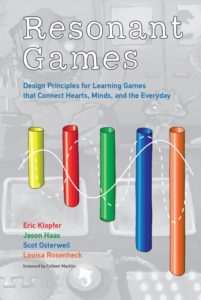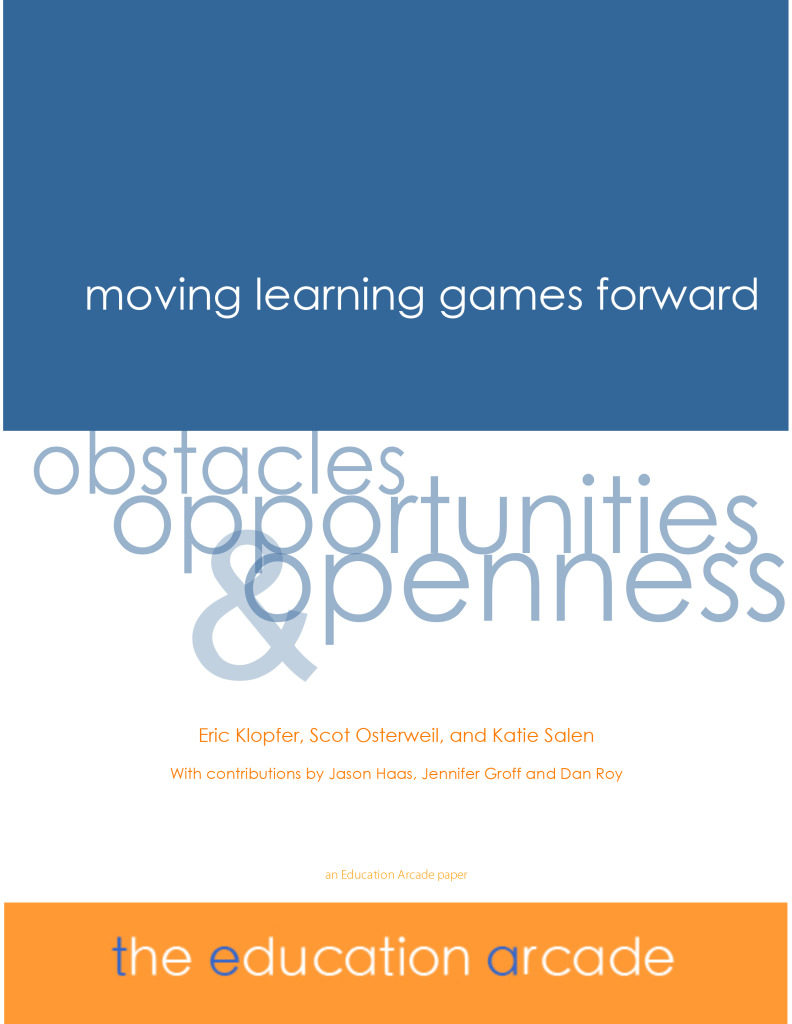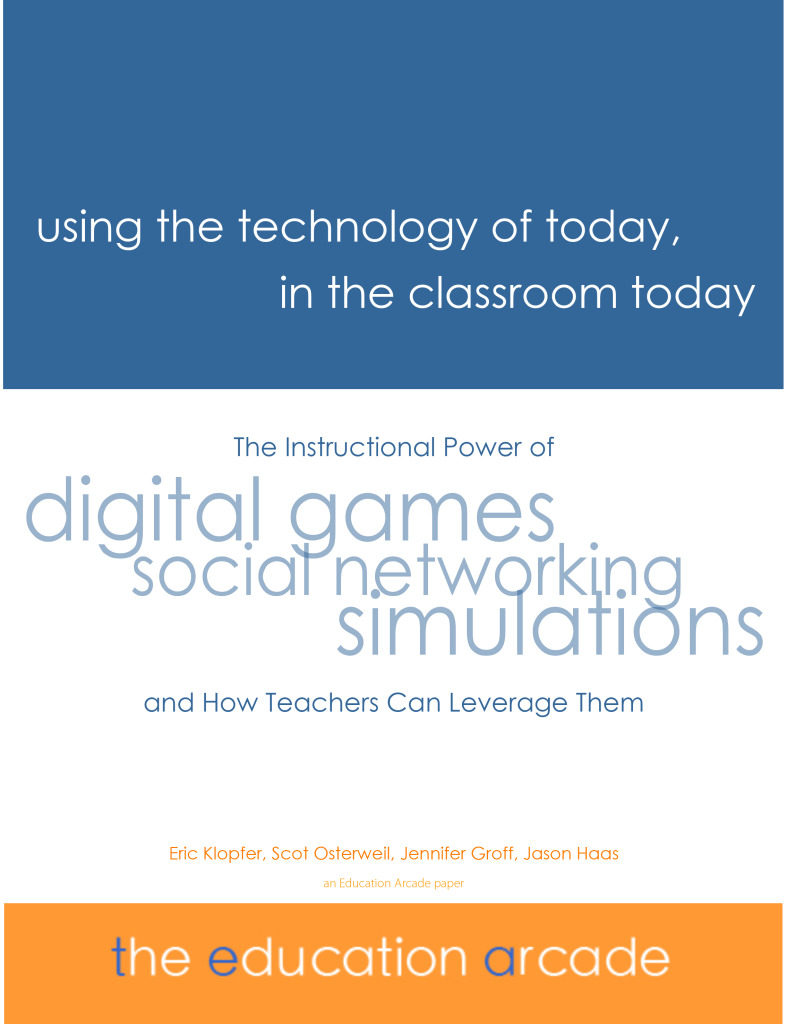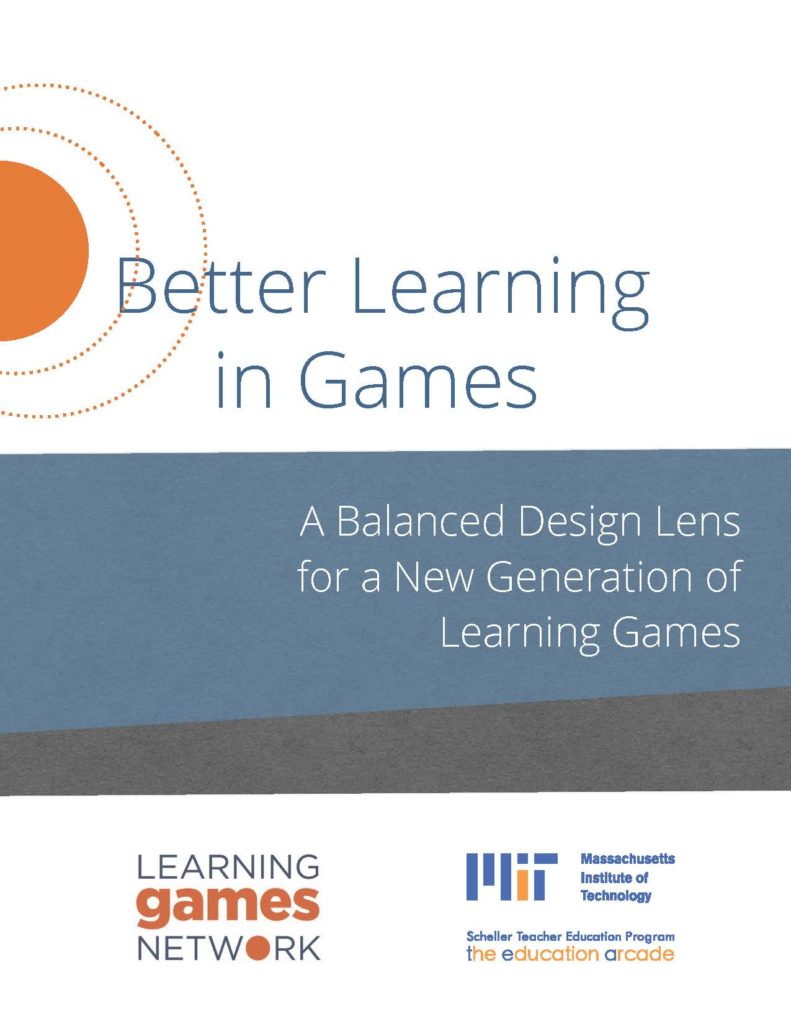Publications
STEP/TEA Lab Publications
Research from the Scheller Teacher Education Program is widely available in scholarly publications and DSpace, (MIT’s open-access repository of articles).
Resonant Games, published in 2018, discusses much of our work. You can find it at MIT Press, Amazon, or read it for free online.

A comprehensive publication list of research and white papers has been included below:

The Decoding Approach to CT Integration
This white paper authored by Irene Lee, a research scientist in the MIT STEP Lab, provides a description of a new approach to CT integration called “Decoding”: why it was developed, which theories and practices it builds upon, how it was developed, and how it compares and contrasts with other CT integration approaches.

Moving Learning Games Forward
One of two white papers co-authored by Prof. Eric Klopfer, Director of the Scheller Teacher Education Program, and Scot Osterweil, Creative Director at the Education Arcade. This one focuses on the design of learning games and what makes them powerful tools for learning.

Learning Across Realities: Virtual and Augmented Reality in Education (Report)
Dan Roy (MIT Education Arcade) and Iulian Radu (Harvard University Graduate School of Education) wrote a report on using virtual and augmented realities in education, called Learning Across Realities. This report is for anyone who cares about learning and immersive media, but especially creators and curators. For educators, they show examples in educational contexts and recommendations for how to choose great experiences. For designers, they list principles and heuristics to build powerful interactions. For researchers, they summarize literature on critical concepts like presence, immersion, and embodiment. Both authors are educators, researchers, designers, and technologists, and they consider the potential of these emerging media from those perspectives.

Using the Technology of Today in the Classroom Today
The second of two white papers co-authored by Prof. Eric Klopfer, Director of the Scheller Teacher Education Program, and Scot Osterweil, Creative Director at the Education Arcade. This one focuses on the practical implications of using games in the classroom.

Balanced Design
The MIT Scheller Teacher Education Program and Education Arcade staff, in collaboration with the Learning Games Network, published a design guide, Better Learning in Games: A Balanced Design Lens for a New Generation of Learning Games.
Jen Groff, who received her PhD from the lab, led the development of the guide in collaboration with Scheller Teacher Education Program staff Jody-Clarke-Midura, Louisa Rosenheck, and Eric Klopfer, as well as other leading researchers in the field of learning games.
2018
- E. Klopfer, J. Haas, S. Osterweil, and L. Rosenheck, Resonant games: design principles for learning games that connect hearts, minds, and the everyday, MIT Press, 2018.
[Bibtex] - D. Clark, P. Medlock-Walton, R. Boquín, and E. Klopfer, “Multiplayer disciplinarily-integrated agent-based games: surge gameblox,” Simulation and gaming, 2018.
[Bibtex]
2017
- S. Yoon, E. Anderson, J. Koehler-Yom, C. Evans, M. Park, J. Sheldon, and …, “Teaching about complex systems is no simple matter: building effective professional development for computer-supported complex systems instruction,” Instructional science, vol. 45, iss. 1, p. 99–121, 2017.
[Bibtex] - M. Cheng, L. Rosenheck, C. Lin, and E. Klopfer, “Analyzing gameplay data to inform feedback loops in the radix endeavor,” Computers & education, vol. 111, p. 60–73, 2017.
[Bibtex] - E. Klopfer, “Massively multiplayer online roleplaying games and virtual reality combine for learning,” Virtual, augmented, and mixed realities in education, p. 179–192, 2017.
[Bibtex] - L. Rosenheck, J. Clarke-Midura, S. Gordon-Messer, and E. Klopfer, “Tipping the scales: classroom feasibility of the radix endeavor game,” Serious games and edutainment applications, p. 225–258, 2017.
[Bibtex]
2016
- S. Yoon, E. Anderson, E. Klopfer, J. Koehler-Yom, J. Sheldon, I. Schoenfeld, and …, “Designing computer-supported complex systems curricula for the next generation science standards in high school science classrooms,” Systems, vol. 4, iss. 4, p. 38–38, 2016.
[Bibtex] - L. Rosenheck, S. Gordon-Messer, J. Clarke-Midura, and E. Klopfer, “Design and implementation of an mmo: approaches to support inquiry learning with games,” Handbook of research on gaming trends in p-12 education, p. 33–54, 2016.
[Bibtex] - J. Sheldon, S. Yoon, J. Koehler-Yom, M. Oztok, E. Anderson, I. Schoenfeld, and …, Student understanding of scientific practices and crosscutting themes via an ngss–targeted curriculum and instruction project, 2016.
[Bibtex] - L. Rosenheck, S. Gordon-Messer, J. Clarke-Midura, and E. Klopfer, “Design and implementation of an mmo,” Information science reference, 2016.
[Bibtex]
2015
- S. Yoon, J. Koehler-Yom, E. Anderson, J. Lin, and E. Klopfer, “Using an adaptive expertise lens to understand the quality of teachers’ classroom implementation of computer-supported complex systems curricula in high school science,” Research in science & technological education, vol. 33, iss. 2, p. 237–251, 2015.
[Bibtex] - S. Yoon, E. Anderson, J. Koehler-Yom, E. Klopfer, J. Sheldon, D. Wendel, and …, “Design features for computer-supported complex systems learning and teaching in high school science classrooms,” International society of the learning sciences, 2015.
[Bibtex] - S. Yoon, E. Anderson, J. Koehler-Yom, E. Klopfer, J. Sheldon, D. Wendel, and …, “Designing curriculum and instruction for computer-supported complex systems teaching and learning in high school science classrooms,” J-stem: journal of research in stem education, vol. 1, iss. 1, p. 4–14, 2015.
[Bibtex] - S. Yoon, J. Koehler-Yom, E. Anderson, M. Oztok, E. Klopfer, I. Schoenfeld, and …, “Impacts on student understanding of scientific practices and crosscutting themes through an ngss–designed computer-supported curriculum and instruction project,” International society of the learning sciences, vol. 1, p. 142–149, 2015.
[Bibtex] - S. Yoon, J. Koehler-Yom, E. Anderson, J. Lin, and E. Klopfer, Using an adaptive expertise lens to understand the quality of teachers’ classroom implementation of computer-supported reform curricula in high school science, Taylor & Francis, 2015.
[Bibtex] - S. Yoon, E. Klopfer, S. Goh, J. Sheldon, I. Schoenfeld, D. Wendel, and …, Building curriculum and instruction for the next generation science standards: articulating design features for computer-supported complex systems learning in science classrooms, 2015.
[Bibtex] - E. Klopfer, “Luís ana leal da costa,” Massachusetts institute of technology, 2015.
[Bibtex] - L. Rosenheck, S. Gordon-Messer, J. Clarke-Midura, and E. Klopfer, “Design and implementation of an mmo: approaches to support inquiry learning with games,” Igi global, 2015.
[Bibtex]
2014
- J. Perry and E. Klopfer, “Ubiqbio: adoptions and outcomes of mobile biology games in the ecology of school,” Computers in the schools 31 (1-2), p. 43–64, 2014.
[Bibtex] - S. Conrad, J. Clarke-Midura, and E. Klopfer, “A framework for structuring learning assessment in a massively multiplayer online educational game: experiment centered design,” International journal of game-based learning (ijgbl), vol. 4, iss. 1, p. 37–59, 2014.
[Bibtex] - N. Holbert, D. Weintrop, U. Wilensky, P. Sengupta, S. Killingsworth, K. Krinks, and …, “Combining video games and constructionist design to support deep learning in play,” International society of the learning sciences, 2014.
[Bibtex] - T. Liu, “Taleblazer multiplayer: expanding multiplayer functionality for meaningful location-based ar games,” Massachusetts institute of technology, 2014.
[Bibtex]
2013
- H. Duh and E. Klopfer, “Augmented reality learning,” Computers & education 68 (c), p. 534–535, 2013.
[Bibtex] - E. Klopfer and S. Osterweil, “The boom and bust and boom of educational games,” Transactions on edutainment ix, p. 290–296, 2013.
[Bibtex] - J. Clarke-Midura, L. Rosenheck, J. Haas, and E. Klopfer, “The radix endeavor: designing a massively multiplayer online game around collaborative problem solving in stem,” International society of the learning sciences, 2013.
[Bibtex] - L. Rosenheck, J. Haas, and E. Klopfer, “The radix endeavor: designing a massively multiplayer online game around collaborative problem solving in stem,” International society of the learning sciences, 2013.
[Bibtex] - S. Yoon, E. Klopfer, J. Sheldon, I. Schoenfeld, D. Wendel, J. Wang, and …, “Designing to improve biology understanding complex systems in high school classrooms: no simple matter!,” International society of the learning sciences, 2013.
[Bibtex]
2012
- E. Klopfer, J. Sheldon, J. Perry, and V. Chen, “Ubiquitous games for learning (ubiqgames): weatherlings, a worked example,” Journal of computer assisted learning, vol. 28, iss. 5, p. 465–476, 2012.
[Bibtex] - B. Coulter, E. Klopfer, J. Sheldon, and J. Perry, Discovering familiar places, Cambridge University Press, 2012.
[Bibtex] - E. Klopfer and J. Haas, The more we know: nbc news, educational innovation, and learning from failure, MIT Press, 2012.
[Bibtex] - T. Marsh, L. Nickole, E. Klopfer, and J. Haas, “Blended in-game and off-game learning: assimilating serious games in the classroom and curriculum,” International conference on serious games development and applications, p. 110–122, 2012.
[Bibtex] - S. Goh, S. Yoon, J. Wang, Z. Yang, and E. Klopfer, “Investigating the relative difficulty of complex systems ideas in biology,” International society of the learning sciences, 2012.
[Bibtex] - E. Klopfer and R. Purushotma, “Using simulations as a starting point for constructing meaningful learning games,” Computer games and new media cultures, p. 603–617, 2012.
[Bibtex] - J. Haas and E. Klopfer, The more we know: nbc news, educational innovation, and learning from failure, MIT Press, 2012.
[Bibtex]
2011
- T. Marsh, L. Nickole, E. Klopfer, C. Xuejin, S. Osterweil, and J. Haas, “Fun and learning: blending design and development dimensions in serious games through narrative and characters,” Serious games and edutainment applications, p. 273–288, 2011.
[Bibtex] - T. Marsh, C. Xuejin, L. Nickole, S. Osterweil, E. Klopfer, and J. Haas, “Fun and learning: the power of narrative,” Proceedings of the 6th international conference on foundations of digital …, 2011.
[Bibtex] - S. Osterweil and E. Klopfer, Are games all child’s play?, Bloomsbury Publishing, 2011.
[Bibtex] - B. Coulter, D. Lawlor, E. Klopfer, J. Sheldon, and L. Rosenheck, “Building engagement with technology-enhanced local learning,” White paper for the national science foundation convening on youth …, 2011.
[Bibtex] - J. Laurendi, “Augmented reality games: improved data layers,” Massachusetts institute of technology, 2011.
[Bibtex] - J. Haas, J. Hammerman, E. Klopfer, and C. Miller, “User behavior in nbc news,” International journal of learning and media, vol. 3, iss. 2, 2011.
[Bibtex] - N. Bieber, “Simlogo: improving simulations in starlogo tng,” Massachusetts institute of technology, 2011.
[Bibtex] - V. Umapathy, “An adaptive user interface for open educational content,” Massachusetts institute of technology, 2011.
[Bibtex] - C. Cheng, “Starlogo camera controls and enhancements,” Massachusetts institute of technology, 2011.
[Bibtex] - D. Lam, “Intuitive fully integrated platform for designing interactive objects in quest atlantis,” Massachusetts institute of technology, 2011.
[Bibtex]
2010
- E. Klopfer and J. Sheldon, “Augmenting your own reality: student authoring of science‐based augmented reality games,” New directions for youth development, vol. 2010, iss. 128, p. 85–94, 2010.
[Bibtex] - J. Sheldon, J. Perry, E. Klopfer, J. Ong, V. Chen, P. Tzuo, and L. Rosenheck, “Weatherlings: a new approach to student learning using web-based mobile games,” Proceedings of the fifth international conference on the foundations of …, 2010.
[Bibtex] - D. McFarland and E. Klopfer, “Network search: a new way of seeing the education knowledge domain,” Teachers college record, vol. 112, iss. 10, p. 2664–2702, 2010.
[Bibtex] - R. Falconi, “Usability and game design: improving the mitar game editor,” Massachusetts institute of technology, 2010.
[Bibtex] - C. Dede, P. O’Shea, M. Dunleavy, and E. Klopfer, “Augmenting reality for learning with wireless mobile devices, part 2,” Society for information technology & teacher education international …, 2010.
[Bibtex] - D. Clark, M. Martinez-Garza, N. Enyedy, C. Steinkuehler, K. Squire, M. Jan, and …, “Session details: terra nova toward terra firma: data on games for science learning,” Proceedings of the 9th international conference of the learning sciences …, 2010.
[Bibtex] - E. Klopfer, C. Zhang, J. Perry, and J. Sheldon, “Gamebuilder: does reduced software complexity allow more time on task?,” Proceedings of the 9th international conference of the learning sciences …, 2010.
[Bibtex] - D. McFarland and E. Klopfer, Mcfarland, daniel, and eric klopfer,” network search: a new way of seeing the educational knowledge domain,” teachers college record, 112 (october, 2010), 2669-2702., 2010.
[Bibtex] - D. Clark, M. Martinez-Garza, N. Enyedy, C. Steinkuehler, K. Squire, M. Jan, and …, “Terra nova toward terra firma: data on games for science learning,” 9th international conference of the learning sciences, icls, vol. 2010, 2010.
[Bibtex] - E. Klopfer, H. Scheintaub, W. Huang, and D. Wendel, “Learning connections-science-constructing learning,” Learning and leading with technology, vol. 37, iss. 5, p. 26–26, 2010.
[Bibtex] - Y. Sasmaz, “Extending the limits of weatherlings: a ubiquitous, educational, multiplayer, web-based game for mobile and desktop platforms,” Massachusetts institute of technology, 2010.
[Bibtex] - C. Zhang, “Gamebuilder, an outdoor ar creation software,” Massachusetts institute of technology, 2010.
[Bibtex] - O. Lin, “The development of network enabled augmented reality mobile applications,” Massachusetts institute of technology, 2010.
[Bibtex]
2009
- E. Klopfer, S. Osterweil, and K. Salen, Moving learning games forward, Cambridge, MA: The Education Arcade, 2009.
[Bibtex] - E. Klopfer, S. Osterweil, J. Groff, and J. Haas, “Using the technology of today in the classroom today: the instructional power of digital games, social networking, simulations and how teachers can leverage them,” The education arcade, vol. 1, p. 20–20, 2009.
[Bibtex] - E. Klopfer, H. Scheintaub, W. Huang, D. Wendel, and R. Roque, “The simulation cycle: combining games, simulations, engineering and science using starlogo tng,” E-learning and digital media, vol. 6, iss. 1, p. 71–96, 2009.
[Bibtex] - H. Jenkins, B. Camper, A. Chisholm, N. Grigsby, E. Klopfer, S. Osterweil, and …, “From serious games to serious gaming,” Serious games: mechanisms and effects. routledge, new york, p. 448–468, 2009.
[Bibtex] - E. Klopfer, H. Scheintaub, W. Huang, and D. Wendel, “Starlogo tng,” Artificial life models in software, p. 151–182, 2009.
[Bibtex] - E. Klopfer, J. Haas, and H. Jenkins, “The education arcade,” Mitp, 2009.
[Bibtex] - M. Ng, “Ubiqgames: casual, educational, multiplayer games for mobile and desktop platforms,” Massachusetts institute of technology, 2009.
[Bibtex] - C. Steinkuehler, “Games, learning and society,” E-learning and digital media, vol. 6, iss. 1, p. 1–3, 2009.
[Bibtex] - E. Klopfer, H. Scheintaub, and M. Scheintaub, “Complexity and biology–bringing quantitative science to the life sciences classroom,” Biomath in schools, p. 157–167, 2009.
[Bibtex] - T. Chin, “Augmented reality on the iphone platform,” Massachusetts institute of technology, 2009.
[Bibtex] - S. Yoon, T. Um, and E. Klopfer, “Teaching complex dynamic systems to young students with starlogo. the journal of computers and mathematics and science teaching.,” Colección digital eudoxus, vol. 1, iss. 6, 2009.
[Bibtex] - E. Klopfer, 11.127 j/11.252 j/cms. 590j/cms. 863j computer games and simulations for investigation and education, spring 2009, 2009.
[Bibtex] - Y. Tu, “A framework for teaching biology using starlogo tng: from dna to evolution,” Massachusetts institute of technology, 2009.
[Bibtex] - M. D’Ambrosio, “Three dimensional terrain editing in starlogo tng,” Massachusetts institute of technology, 2009.
[Bibtex] - C. Wong, “Kid’s survey network: teaching data literacy with multiplayer online games,” Massachusetts institute of technology, 2009.
[Bibtex]
2008
- E. Klopfer and K. Squire, “Environmental detectives—the development of an augmented reality platform for environmental simulations,” Educational technology research and development, vol. 56, iss. 2, p. 203–228, 2008.
[Bibtex] - E. Klopfer, Augmented learning: research and design of mobile educational games, MIT press, 2008.
[Bibtex] - J. Perry, E. Klopfer, M. Norton, D. Sutch, R. Sandford, and K. Facer, “Ar gone wild: two approaches to using augmented reality learning games in zoos,” Proceedings of the 8th international conference on international conference …, 2008.
[Bibtex] - J. Guryan, B. Jacob, E. Klopfer, and J. Groff, “Using technology to explore social networks and mechanisms underlying peer effects in classrooms.,” Developmental psychology, vol. 44, iss. 2, p. 355–355, 2008.
[Bibtex] - E. Glinert, “The human controller: usability and accessibility in video game interfaces,” Massachusetts institute of technology, 2008.
[Bibtex] - E. Hayes, J. Gee, I. Games, R. Torres, K. Peppler, Y. Kafai, N. Pinkard, and …, “New perspectives on learning through (game) design,” Proceedings of the 8th international conference on international conference …, 2008.
[Bibtex] - E. Klopfer and H. Scheintaub, “Starlogo tng: science in student-programmed simulations,” Proceedings of the 8th international conference on international conference …, 2008.
[Bibtex] - T. Wang, “Case for usability: designing outdoor augmented reality games,” Massachusetts institute of technology, 2008.
[Bibtex] - P. Gerjets, K. Scheiter, J. Schuh, M. Jacobson, R. Azevedo, E. Klopfer, and …, “A number of available resources offer guidance about hypermedia design strategies, many of which rely on principles of user-centered design. many recent efforts, however, have …,” Educational technology research and development, vol. 56, iss. 1, p. 93–100, 2008.
[Bibtex]
2007
- K. Squire and E. Klopfer, “Augmented reality simulations on handheld computers,” The journal of the learning sciences, vol. 16, iss. 3, p. 371–413, 2007.
[Bibtex] - E. Rosenbaum, E. Klopfer, and J. Perry, “On location learning: authentic applied science with networked augmented realities,” Journal of science education and technology, vol. 16, iss. 1, p. 31–45, 2007.
[Bibtex] - R. Roque, “Openblocks: an extendable framework for graphical block programming systems,” Massachusetts institute of technology, 2007.
[Bibtex] - A. Begel and E. Klopfer, “Starlogo tng: an introduction to game development,” Journal of e-learning, vol. 53, p. 146–146, 2007.
[Bibtex] - E. Rosenbaum, E. Klopfer, B. Boughner, and L. Rosenheck, “Engaging students in science controversy through an augmented reality role-playing game,” Proceedings of the 8th iternational conference on computer supported …, 2007.
[Bibtex] - E. Klopfer, “Blurring lines with mobile learning games,” Educational technology, p. 43–46, 2007.
[Bibtex] - D. Roy, “Mastery and the mobile future of massively multiplayer games,” Massachusetts institute of technology, 2007.
[Bibtex] - E. Klopfer, “Starlogo tng-making game and simulation development accessible to students and teachers,” Michigan institute of technology press, 2007.
[Bibtex] - B. Schmeckpeper, “Outdoor augmented reality n-th game editing suite,” Massachusetts institute of technology, 2007.
[Bibtex] - E. Klopfer, “Lightly augmenting reality,” Space time play, p. 380–383, 2007.
[Bibtex] - E. Meir, E. Steinberg, and E. Klopfer, Oos 17-6: making ecobeaker models graphically using codeblocks: a new framework for teaching modeling to biology students, 2007.
[Bibtex] - E. Rosenbaum, E. Klopfer, and J. Perry, “This exploratory study investigated data-gathering behaviors exhibited by 100 seventh-grade students as they participated in a scientific inquiry-based curriculum project …,” Journal of science education and technology, vol. 16, iss. 1, p. 99–111, 2007.
[Bibtex] - N. Chatterjee, T. Grove, R. Summons, R. Ferrari, G. Flierl, and S. Legg, “Earth, atmospheric, and planetary sciences (12)-research and teaching output of the mit community,” Geobiology, 2007.
[Bibtex] - E. Klopfer and R. Gibb, 11.131 educational theory and practice iii, spring 2007, 2007.
[Bibtex] - J. J. III, “A network development and runtime environment for starlogo tng,” Massachusetts institute of technology, 2007.
[Bibtex] - X. Liu, “Improving driving training with a handheld performance support system,” Massachusetts institute of technology, 2007.
[Bibtex]
2006
- K. Wang, C. McCaffrey, D. Wendel, and E. Klopfer, “3d game design with programming blocks in starlogo tng,” Proceedings of the 7th international conference on learning sciences, p. 1008–1009, 2006.
[Bibtex] - S. Yoon and E. Klopfer, “Feedback (f) fueling adaptation (a) network growth (n) and self-organization (s): a complex systems design and evaluation approach to professional development,” Journal of science education and technology 15 (5-6), p. 353–366, 2006.
[Bibtex] - C. McCaffrey, Starlogo tng: the convergence of graphical programming and text processing, 2006.
[Bibtex] - D. Wendel, “Design and editing 2.5-dimensional terrain in starlogo tng,” Massachusetts institute of technology, 2006.
[Bibtex] - S. Yoon and E. Klopfer, “Feedback and adaptation within a complex systems approach to designing for scalable and sustainable professional development,” Proceedings of the 7th international conference on learning sciences, p. 866–872, 2006.
[Bibtex] - E. Klopfer and R. Gibb, 11.129 educational theory and practice i, fall 2006, 2006.
[Bibtex]
2005
- E. Klopfer and S. Yoon, “Developing games and simulations for today and tomorrow’s tech savvy youth,” Techtrends, vol. 49, iss. 3, p. 33–41, 2005.
[Bibtex] - E. Klopfer, J. Perry, K. Squire, M. Jan, and C. Steinkuehler, “Mystery at the museum: a collaborative game for museum education,” Proceedings of th 2005 conference on computer support for collaborative …, 2005.
[Bibtex] - E. Klopfer, S. Yoon, and J. Perry, “Using palm technology in participatory simulations of complex systems: a new take on ubiquitous and accessible mobile computing,” Journal of science education and technology, vol. 14, iss. 3, p. 285–297, 2005.
[Bibtex] - E. Meir, J. Perry, D. Stal, S. Maruca, and E. Klopfer, “How effective are simulated molecular-level experiments for teaching diffusion and osmosis?,” Cell biology education, vol. 4, iss. 3, p. 235–248, 2005.
[Bibtex] - E. Klopfer, J. Perry, K. Squire, and M. Jan, “Collaborative learning through augmented reality role playing,” Proceedings of th 2005 conference on computer support for collaborative …, 2005.
[Bibtex] - E. Klopfer, S. Yoon, and T. Um, “Teaching complex dynamic systems to young students with starlogo,” Journal of computers in mathematics and science teaching, vol. 24, iss. 2, p. 157–178, 2005.
[Bibtex] - E. Klopfer, “Playing to learn: state-of-the-art computer games go to school,” Access learning, p. 10–11, 2005.
[Bibtex] - A. Begel and E. Klopfer, “Starlogo: a programmable complex systems modeling environment for students and teachers,” Artificial life models in software, p. 187–209, 2005.
[Bibtex] - H. Scheintaub, E. Klopfer, M. Scheintaub, and E. Rosenbaum, “Complexity and biology-bringing quantitative science to the life sciences classroom.,” Biomath in the schools, p. 157–168, 2005.
[Bibtex] - E. Klopfer, 11.127/11.252 computer games and simulations for investigation and education, spring 2005, 2005.
[Bibtex]
2004
- E. Klopfer, S. Yoon, and L. Rivas, “Comparative analysis of palm and wearable computers for participatory simulations,” Journal of computer assisted learning, vol. 20, iss. 5, p. 347–359, 2004.
[Bibtex] - E. Klopfer and K. Squire, “Getting your socks wet: augmented reality environmental science,” Proceedings of the 6th international conference on learning sciences, vol. 614, 2004.
[Bibtex] - E. Klopfer, M. Resnick, J. Maloney, B. Silverman, A. diSessa, A. Begel, and …, “Programming revisited: the educational value of computer programming,” Proceedings of the 6th international conference on learning sciences, p. 16–18, 2004.
[Bibtex] - S. Yoon, E. Klopfer, G. Richardson, and J. Taylor, “Insights into the complexity of designing for professional development networks in educational technologies: tensions between structure and agency,” Proceedings of the 6th international conference on learning sciences, vol. 644, 2004.
[Bibtex]
2003
- H. Jenkins, E. Klopfer, K. Squire, and P. Tan, “Entering the education arcade,” Computers in entertainment (cie), vol. 1, iss. 1, p. 8–8, 2003.
[Bibtex] - E. Klopfer, “Technologies to support the creation of complex systems models—using starlogo software with students,” Biosystems 71 (1-2), p. 111–122, 2003.
[Bibtex] - E. Klopfer and K. Squire, “Augmented reality on pdas,” Annual meeting of the american educational research association, chicago, il …, 2003.
[Bibtex] - E. Klopfer and A. Begel, “Starlogo under the hood and in the classroom,” Kybernetes 32 (1/2), p. 15–37, 2003.
[Bibtex] - P. Cheung, “Charles river city: an educational augmented reality simulation pocket pc game,” Massachusetts institute of technology, 2003.
[Bibtex] - S. McLester, H. Davidson, M. Brown, D. Warlick, E. Klopfer, K. Squire, P. Tan, and …, “Top 10 innovative projects,” Technology & learning, vol. 24, iss. 4, p. 24–8, 2003.
[Bibtex] - T. Kolev and E. Klopfer, Full featured virtual world games framework using rsip, a novel command protocol, 2003.
[Bibtex] - E. Klopfer, 11.125 exploring k-12 clasroom teaching, spring 2003, 2003.
[Bibtex] - E. Klopfer, 11.127/11.252 computer modeling for investigation and education, spring 2003, 2003.
[Bibtex]
2002
- E. Klopfer, K. Squire, and H. Jenkins, “Environmental detectives: pdas as a window into a virtual simulated world,” Wireless and mobile technologies in education, 2002. proceedings. ieee …, 2002.
[Bibtex] - E. Klopfer, V. Colella, and M. Resnick, “New paths on a starlogo adventure,” Computers & graphics, vol. 26, iss. 4, p. 615–622, 2002.
[Bibtex] - E. Klopfer and E. Woodruff, “The impact of distributed and ubiquitous computational devices on the collaborative learning environment,” Proceedings of the conference on computer support for collaborative learning …, 2002.
[Bibtex] - E. Klopfer and T. Um, “Young adventurers-modeling of complex dynamic systems with elementary and middle school students,” International conference on the learning sciences, 2002.
[Bibtex] - D. Ricket, “The women’s technology program: eecs outreach for high school students,” Massachusetts institute of technology, 2002.
[Bibtex] - E. Klopfer, 11.124 introduction to teaching and learning mathematics and science, fall 2002, 2002.
[Bibtex]
2001
- V. Colella, E. Klopfer, and M. Resnick, “Adventures in modeling: exploring complex, dynamic systems with starlogo.,” Teachers college press, po box 20, williston, vt, p. 5495–20, 2001.
[Bibtex] - V. Colella, E. Klopfer, and M. Resnick, “Adventures in modeling,” Exploring complex, 2001.
[Bibtex] - M. Lo, “Modeling and study of infectious disease: stochastic modeling for antibiotic resistance and treatment strategies,” Massachusetts institute of technology, 2001.
[Bibtex]